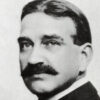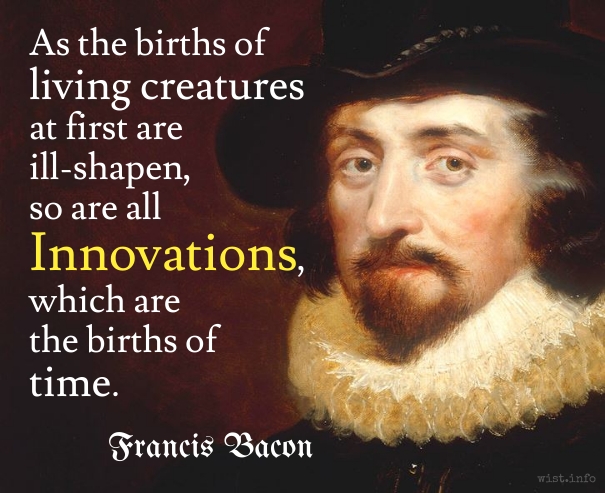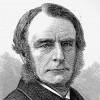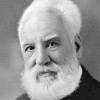Some of my youthful readers are developing wonderful imaginations. This pleases me. Imagination has brought mankind through the Dark Ages to its present state of civilization. Imagination led Columbus to discover America. Imagination led Franklin to discover electricity. Imagination has given us the steam engine, the telephone, the talking-machine, and the automobile, for these things had to be dreamed of before they became realities. So I believe that dreams — day dreams, you know, with your eyes wide open and your brain machinery whizzing — are likely to lead to the betterment of the world. The imaginative child will become the imaginative man or woman most apt to create, to invent, and therefore to foster civilization. A prominent educator tells me that fairy tales are of untold value in developing imagination in the young. I believe it.
L. Frank Baum (1856-1919) American author [Lyman Frank Baum]
The Lost Princess of Oz, Introduction (1917)
(Source)
Quotations about:
invention
Note not all quotations have been tagged, so Search may find additional quotes on this topic.
Again, we should notice the force, effect, and consequences of inventions, which are nowhere more conspicuous than in those three which were unknown to the ancients; namely, printing, gunpowder, and the compass. For these three have changed the appearance and state of the whole world; first in literature, then in warfare, and lastly in navigation: and innumerable changes have been thence derived, so that no empire, sect, or star, appears to have exercised a greater power and influence on human affairs than these mechanical discoveries.
[Rursus, vim et virtutem et consequentias rerum inventarum notare juvat; quae non in aliis manifestius occurrunt, quam in illis tribus quae antiquis incognitae, et quarum primordia, licet recentia, obscura et ingloria sunt: Artis nimirum Imprimendi, Pulveris Tormentarii, et Acus Nauticae. Haec enim tria rerum faciem et statum in orbe terrarum mutaverunt: primum, in re literaria; secundum, in re bellica; tertium, in navigationibus: unde innumerae rerum mutationes sequutae sunt; ut non imperium aliquod, non secta, non stella, majorem efficaciam et quasi influxum super res humanas exercuisse videatur, quam ista mechanica exercuerunt.]
Francis Bacon (1561-1626) English philosopher, scientist, author, statesman
Instauratio Magna [The Great Instauration], Part 2 “Novum Organum [The New Organon],” Book 1, Aphorism # 129 (1620) [tr. Wood (1831)]
(Source)
(Source (Latin)). Alternate translations:
Again, it is well to observe the force and virtue and consequences of discoveries; and these are to be seen nowhere more conspicuously than in those three which were unknown to the ancients, and of which the origin, though recent, is obscure and inglorious; namely, printing, gunpowder, and the magnet. For these three have changed the whole face and state of things throughout the world; the first in literature, the second in warfare, the third in navigation; whence have followed innumerable changes; insomuch that no empire, no sect, no star seems to have exerted greater power and influence in human affairs than these mechanical discoveries.
[tr. Spedding (1858)]
Again, it is well to mark the force, virtue, and consequences of discoveries; and these occur nowhere more manifestly than in those which were unknown to the ancients, and whose origin, though recent, is obscure and inglorious; the Arts, namely, of Printing, of Gunpowder, and the Mariner's Compass. For these three have changed the face and condition of things all over the world; the first in letters, the second in war, the third in navigation. And hence numberless changes have followed; so that no government, no sect, no star, seems to have exercised greater power and influence over human affairs than these mechanical discoveries.
[tr. Johnson (1859)]
Again, it helps to notice the force, power and consequences of discoveries, which appear at their clearest in three things that were unknown to antiquity, and whose origins, though recent, are obscure and unsung: namely, the art of printing, gunpowder and the nautical compass. In fact these three things have changed the face and condition of things all over the globe: the first in literature; the second in the art of war; the third in navigation; and innumerable changes have followed; so that no empire or sect or star seems to have exercised a greater power and influence on human affairs than those mechanical things.
[tr. Silverthorne (2000)]
Notice the vigour of discoveries, their power to generate consequences. This is nowhere more obvious than in three discoveries that the ancients didn’t know and whose origins (all quite recent) were obscure and humdrum. I am talking about the arts of printing, gunpowder, and the nautical compass. These three have changed the whole aspect and state of things throughout the world -- the first in literature, the second in warfare, the third in navigation -- bringing about countless changes; so that there seems to have been no empire, no philosophical system, no star that has exerted greater power and influence in human affairs than these mechanical discoveries.
[tr. Bennett (2017)]
It’s always sort of amused me that mankind has been able to come up with a lot of things, two of them being napalm — which is a jellied substance that burns the skin and kills — and Silly Putty, which is something that you can press onto a comic and see a backwards picture of Popeye. And somewhere between these two extremes lies our truth. And I don’t know how good we are at pursuing it.
George Carlin (1937-2008) American comedian
Interview by Marc Cooper, The Progressive (Jul 2001)
(Source)
Discussing the title of his new book, Napalm and Silly Putty.
No one has ever written, painted, sculpted, modeled, built, or invented except literally to get out of hell.
Antonin Artaud (1896-1948) French playwright, actor, director
Van Gogh, the Man Suicided by Society [Le Suicidé de la Société] (1947) [tr. Watson]
(Source)
As the births of living creatures at first are ill-shapen, so are all Innovations, which are the births of time.
Francis Bacon (1561-1626) English philosopher, scientist, author, statesman
“Of Innovations,” Essays, No. 24 (1625)
(Source)
So give me the political economist, the sanitary reformer, the engineer; and take your saints and virgins, relics and miracles. The spinning-jenny and the railroad, Cunard’s liners and the electric telegraph, are to me, if not to you, signs that we are, on some points at least, in harmony with the universe; that there is a mighty spirit working among us, who cannot be your anarchic and destroying Devil, and therefore may be the Ordering and Creating God.
Charles Kingsley (1819-1875) English clergyman, historian, essayist, novelist (pseud. "Parson Lot")
Yeast: A Problem, ch. 5 (1848)
(Source)
The most successful men in the end are those whose success is the result of steady accretion. That intellectuality is more vigorous that has attained its strength gradually. It is the man who carefully advances step by step, with his mind becoming wider and wider — and progressively better able to grasp any theme or situation — persevering in what he knows to be practical, and concentrating his thought upon it, who is bound to succeed in the greatest degree.
Alexander Graham Bell (1847-1922) Scottish-American scientist, inventor, engineer
Interview, in Orison Swett Marden, How They Succeeded, ch. 2 (1901)
(Source)
The inventor … looks upon the world and is not contented with things as they are. He wants to improve whatever he sees, he wants to benefit the world; he is haunted by an idea. The spirit of invention possesses him, seeking materialization.
Perseverance must have some practical end, or it does not avail the man possessing it. A person without a practical end in view becomes a crank or an idiot. Such persons fill our asylums.
Alexander Graham Bell (1847-1922) Scottish-American scientist, inventor, engineer
Interview, in Orison Swett Marden, How They Succeeded, ch. 2 (1901)
(Source)
Whenever you look at a piece of work and you think the fellow was crazy, then you want to pay some attention to that. One of you is likely to be, and you had better find out which one it is. It makes an awful lot of difference.
Charles F. Kettering (1876-1958) American inventor, engineer, researcher, businessman
Comment (1930)
(Source)
As attributed by Francis Davis, inventor of power steering.
There is no great invention, from fire to flying, which has not been hailed as an insult to some god.
J.B.S. Haldane (1892-1964) English geneticist [John Burden Sanderson Haldane]
“Daedalus, or Science and the Future,” speech, Cambridge (24 Feb 1923)
(Source)
For the Father of agriculture
Gave us a hard calling: he first decreed it an art
To work the fields, sent worries to sharpen our mortal wits
And would not allow his realm to grow listless from lethargy […]
So thought and experiment might forge man’s various crafts
Little by little, asking the furrow to yield the corn-blade,
Striking the hidden fire that lies in the veins of flint.[Pater ipse colendi
haud facilem esse viam voluit, primusque per artem
movit agros curis acuens mortalia corda
nec torpere gravi passus sua regna veterno […]
ut varias usus meditando extunderet artis
paulatim et sulcis frumenti quaereret herbam.
Ut silicis venis abstrusum excuderet ignem.]Virgil (70-19 BC) Roman poet [b. Publius Vergilius Maro; also Vergil]
Georgics [Georgica], Book 1, l. 121ff (1.121-124, 133-135) (29 BC) [tr. Day-Lewis (1940)]
(Source)
Telling how Jupiter made life on earth miserable for farmers so as to encourage the development of useful arts and crafts.
(Source (Latin)). Alternate translations:
Nor was Jove pleas'd tillage should easie be:
And first commands with art to plough the soyle,
On mortall hearts imposing care, and toyle;
Nor lets dull sloth benumb men where he reigns [...]
That severall arts by labour might be found,
And men in furrows seek the grain that fell,
And hidden fire from veins of flint compell.
[tr. Ogilby (1649)]
The Sire of Gods and Men, with hard Decrees,
Forbids our Plenty to be bought with Ease:
And wills that Mortal Men, inur'd to toil,
Shou'd exercise, with pains, the grudging Soil.
Himself invented first the shining Share,
And whetted Humane Industry by Care:
Himself did Handy-Crafts and Arts ordain;
Nor suffer'd Sloath to rust his active Reign[...]
That studious Need might useful Arts explore;
From furrow'd Fields to reap the foodful Store:
And force the Veins of clashing Flints t' expire
The lurking Seeds of their Cœlestial Fire.
[tr. Dryden (1709), l. 183-190, 203-206]
Nor thou repine: great Jove, with tasks untry'd
To rouse man's pow'rs, an easier way deny'd;
And first bade mortals stir with art the plain,
Lest sloth should dim the splendors of his reign [...]
That gradual use might hew out arts from man,
That corn's green blade in furrows might be fought,
And from struck flints the fiery sparkle caught.
[tr. Nevile (1767), l. 147-150, 160-162]
Not to dull Indolence and transient Toil
Great Jove resign'd the conquest of the soil:
He sent forth Care to rouse the human heart,
And sharpen genius by inventive art:
Nor tamely suffer'd earth beneath his sway
In unproductive sloth to waste away. [...]
Jove will'd that use, by long experience taught,
Should force out various arts by gradual thought,
Strike from the flint's cold womb the latent flame,
And from the answering furrow nurture claim.
[tr. Sotheby (1800)]
The Sire himself willed the ways of tillage not to be easy, and first aroused the fields by art, whetting the skill of mortals with care; nor suffered he his reign to lie inactive in heavy sloth [...] that experience, by dint of thought, might gradually hammer out the various arts, in furrows seek the blade of corn, and form the veins of flint strike out the hidden fire.
[tr. Davidson (1854)]
Our heavenly Father hath not judged it right
To leave the road of agriculture light:
'Twas he who first made husbandry a plan.
And care a whetstone for the wit of man;
Nor suffer'd he his own domains to lie
Asleep in cumbrous old-world lethargy [...]
That practice might the various arts create,
On study's anvil, by laborious dint,
The plant of corn by furrows propagate,
And strike the fire that lurks in veins of flint.
[tr. Blackmore (1871), ll. 140-145, 154-157]
The wise Father of all willed not that the path of husbandry should be easy; he was the first to break up the earth by human skill, sharpening man's wit by the cares of life, nor suffering his own domains to lie asleep in cumbrous lethargy [...] in order that practice might by slow degrees hammer out art after art on the anvil of thought, might find the corn-blade by delving the furrow, and strike from veins of flint the fire that Jove had hid.
[tr. Wilkins (1873)]
The great Sire himself
No easy road to husbandry assigned,
And first was he by human skill to rouse
The slumbering glebe, whetting the minds of men
With care on care, nor suffering realm of his
In drowsy sloth to stagnate [...]
that use by gradual dint of thought on thought
Might forge the various arts, with furrow's help
The corn-blade win, and strike out hidden fire
From the flint's heart.
[tr. Rhoades (1881)]
For so great Jove, the sire of all, decreed,
No works save those that took us should succeed,
Nor wills his gifts should unimproved remain.
While man inactive slumbers on the plain. [...]
Man seeks for fire concealed within the veins
Of flints, and labour groans upon the plains;
Till, one by one, worked out by frequent thought,
Are crude inventions to perfection brought.
[tr. King (1882), ll. 123-126, 135-138ff]
Father Jove himself willed that the modes of tillage should not be easy, and first stirred the earth by artificial means, whetting the minds of men by anxieties; nor suffered he his subjects to become inactive through oppressive lethargy [...] in order that man’s needs, by dint of thought, might gradually hammer out the various arts, might seek the blade of corn by ploughing, and might strike forth the fire thrust away in the veins of the flint.
[tr. Bryce (1897)]
Our Lord himself willed the way of tillage to be hard, and long ago set art to stir the fields, sharpening the wits of man with care, nor suffered his realm to slumber in heavy torpor [...] that so practice and pondering might slowly forge out many an art, might seek the corn-blade in the furrow and strike hidden fire from the veins of flint.
[tr. Mackail (1899)]
The great Sire himself
No easy road to husbandry assigned,
And first was he by human skill to rouse
The slumbering glebe, whetting the minds of men
With care on care, nor suffering realm of his
In drowsy sloth to stagnate [...]
that use by gradual dint of thought on thought
Might forge the various arts, with furrow's help
The corn-blade win, and strike out hidden fire
From the flint's heart.
[tr. Greenough (1900)]
Allfather himself hath willed
That the pathway of tillage be thorny. He first by man's art broke
Earth's crust, and by care for the morrow made keen the wits of her folk,
Nor suffered his kingdom to drowse 'neath lethargy's crushing chain [...]
That Thought on experience' anvil might shape arts manifold,
And might seek in the furrow the blade that is pledge of the harvest's gold,
And smite from the veins of flint the fire-soul hidden there.
[tr. Way (1912)]
Great Jove himself ordained for husbandry
No easy road, when first he bade earth's fields
Produce by art, and gave unto man's mind
Its whetting by hard care; where Jove is king
He suffers not encumbering sloth to bide. [...]
He purposed that experience and thought
By slow degrees should fashion and forge out
Arts manifold, should seek green blades of corn
By ploughing, and from veins of flinty shard
Hammer the fire.
[tr. Williams (1915)]
The great Father himself has willed that the path of husbandry should not run smooth, who first made art awake the fields, sharpening men’s wits by care, nor letting his kingdom slumber in heavy lethargy [...] so that experience, from taking thought, might little by little forge all manner of skills, seeking in ploughed furrows the blade of corn, striking forth the spark hidden in the veins of flint.
[tr. Fairclough (Loeb) (1916)]
The Father willed it so: He made the path
Of agriculture rough, established arts
Of husbandry to sharpen wits,
Forbidding sloth to settle on his soil
[...] So that mankind
By taking thought might learn to forge its arts
From practice: seek to bring the grain from furrows,
Strike out the fire locked up in veins of flint.
[tr. Bovie (1956)]
Jupiter, father of the gods, decided himself
that the way of the farmer should not be an easy way.
He demanded craft; he tuned our nerves with worries;
he weeded lethargy from his human fields [...]
Thus men are supposed to have found the fire that hides
in the veins of flint. By clever meditation
experience elaborates to skill ...
One can see a triumph in it: the first furrow
sprouting a row of corn ....
[tr. Slavitt (1971)]
The father of cultivation himself did not want its way to be easy and wa first to change the fields by design, sharpening mortal wits with cares, not allowing his kingdoms to become sluggish with heavy old age [...] in order that experience and reflection should beat out skills little by little and seek grain stalks in the furrows, that they should strike out fire hidden in the veins of flint.
[tr. Miles (1980)]
The Father himself
Willed that the path of tillage be not smooth,
And first ordained that skill should cultivate
The land, by care sharpening the wits of mortals,
Nor let his kingdom laze in torpid sloth [...]
That step by step practice and taking thought
Should hammer out the crafts, should seek from furrows
The blade of corn, should strike from veins of flint
The hidden fire.
[tr. Wilkinson (1982)]
The great Father himself willed it,
that the ways of farming should not be easy, and first
stirred the fields with skill, rousing men’s minds to care,
not letting his regions drowse in heavy lethargy [...]
so that thoughtful practice might develop various skills,
little by little, and search out shoots of grain in the furrows,
and strike hidden fire from veins of flint.
[tr. Kline (2001)]
The Father himself hardly
willed that agriculture would be easy when he called forth
the field with his art, whetting human minds with worries,
not letting his kingdom slip into full-blown laziness. [...]
so that, using their brains, men might gradually hammer out
many skills, like searching for stalks of wheat by plowing,
and so that they might strike the spark held in veins of flint.
[tr. Lembke (2004)]
For it was Jupiter himself who willed the ways of husbandry be ones not spared of trouble and it was he who first, through human skill, broke open land, at pains to sharpen wits of men and so prevent his own domain being buried in bone idleness [...] so that by careful thought and deed you'd hone them bit by bit, those skills, to coax from furrows blades of corn and spark shy flame from veins of flint.
[tr. Fallon (2006)]
The Father himself willed the way of husbandry to be severe, first stirred by ingenuity the fields, honing mortal skill with tribulation, and suffered not his realm to laze in lumpish sloth [...] so that need with contemplation might forge sundry arts in time, might seek in furrows the blade of wheat and strike from flinty veins the hidden spark.
[tr. Johnson (2009)]
For Father Jupiter himself ordained
That the way should not be easy. It was he
Who first established the art of cultivation,
Sharpening with their cares the skills of men,
forbidding the world he rules to slumber in ease
[...] all this so want should be
The cause of human ingenuity,
And ingenuity the cause of arts,
Finding little by little the way to plant
New crops by means of plowing, and strike the spark
To ignite the hidden fire in veins of flint.
[tr. Ferry (2015)]
If there is such a thing as luck, then I must be the most unlucky fellow in the world. I’ve never once made a lucky strike in all my life. When I get after something I need, I start finding everything in the world I don’t need — one damn thing after another. I find ninety-nine things I don’t need, and then comes number one hundred , and that — at the very last — turns out to be just what I had been looking for.
















